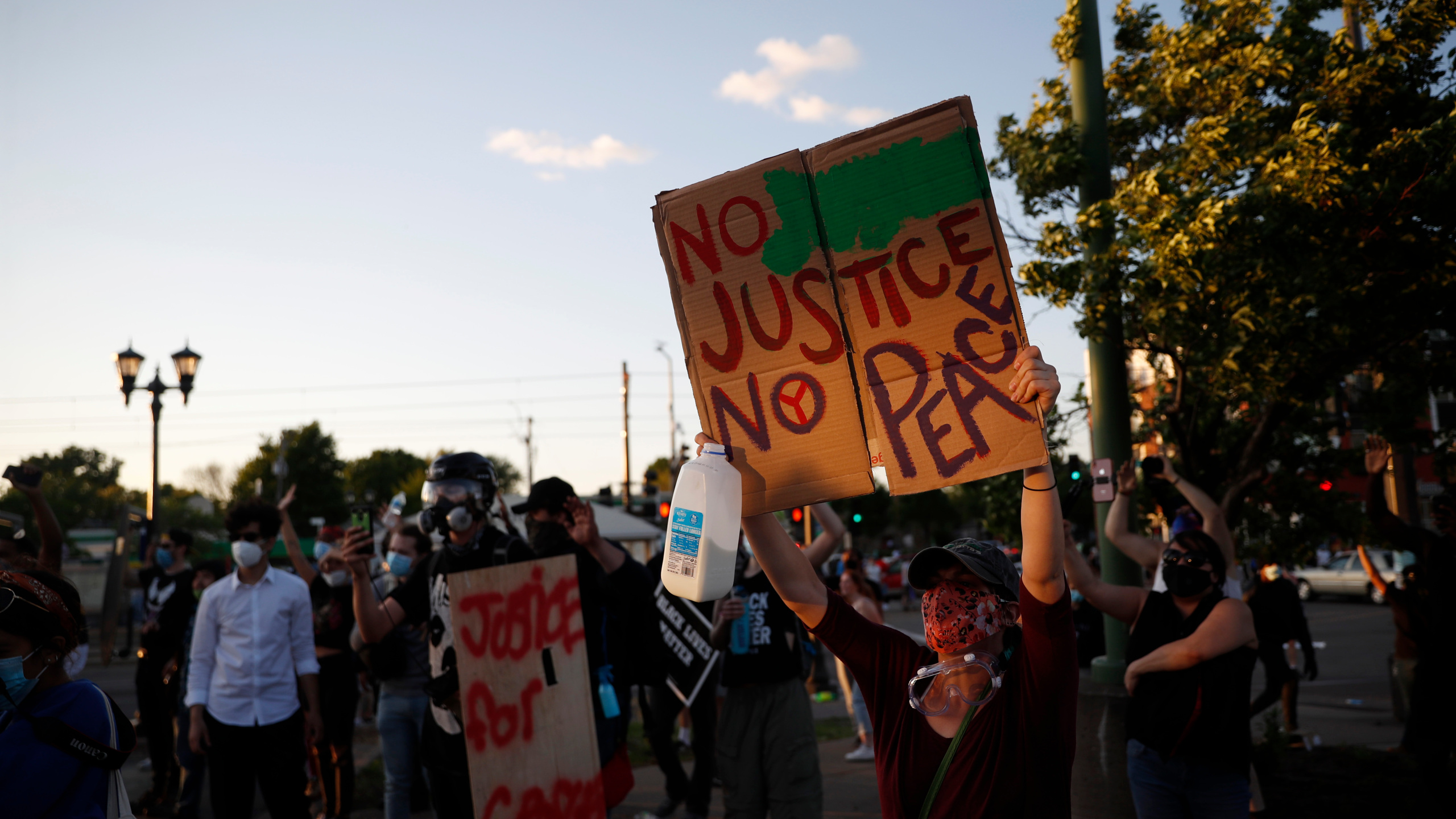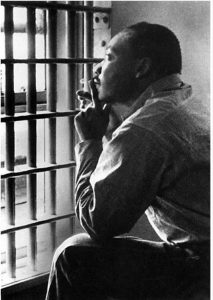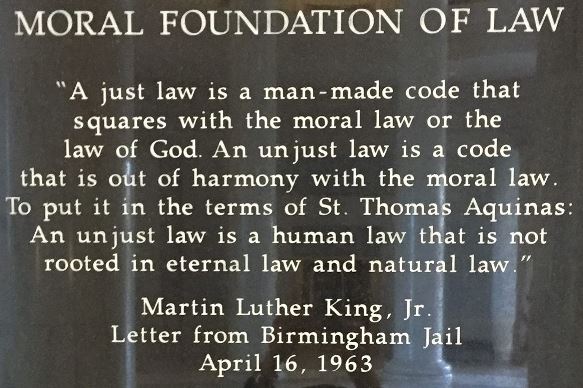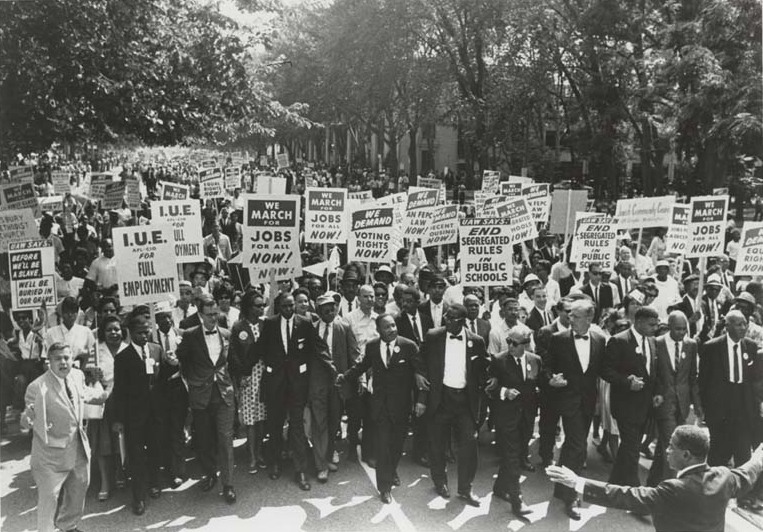One day after the national Martin Luther King, Jr. National Holiday, it is worthwhile to re-read his famous “Letter from a Birmingham Jail.” There had been coordinated protests against segregation in Birmingham, Alabama, in 1963. King had already devised his winning strategy against segregation: nonviolence in a way to force the rest of America, which was not paying attention in large part to southern segregation, to see the injustice.
King’s strategy was brilliant, but with qualifications. It would only work in a free and largely non-racist society. Nonviolent protest had been successful with Mohandas K. “Mahatma” Gandhi in India, where again, the British governors had, for the most part, responded with tolerance and caution. King wagered that when average, mostly non-racist, whites saw the beatings, the use of fire hoses, and dogs, they would become incensed and demand change. They did. However, he also had a powerful tool on his side, the American news media, which was ideologically aligned with the civil rights movement. Thus, they dutifully (and correctly) showed the abuses by police, while 50 years later in Portland with genuine violent riots, they were again aligned with the protestors—only this time they made lawless mobs into sympathetic figures or covered them not at all. 
By working within a largely non-racist, tolerant, Western (and Christian) culture, King’s appeals fell on eager ears. People were ready to right the wrongs of the past. However, it is imperative to note that such marches would never have even taken place in Communist China, the USSR, or Hitler’s Germany. People such as King and Gandhi would have been exterminated long before their careers even started. Can anyone name one mass protest march in Nazi Germany? In fascist Italy? In Saddam’s Iraq? The closest a protest ever came in any of those spots was an attempted coup by the military in Operation Valkyrie at the end of World War II.
So, it is important to understand King knew his audience and knew that, for the most part, his audience was good. This flies in the face of today’s racists, who insist that the United States is a fundamentally racist and unjust country. Quite the contrary, King believed completely in America’s founding. He appealed both to the Declaration and the Constitution—he did not complain that they were “white supremacists’ documents” but rather embraced them as the most liberating writings in the world, even 190 years later.
 When King was arrested on April 12, 1963—ironically one week within the date of the battles of Lexington and Concord—of violating an injunction against “parading, demonstrating, boycotting, trespassing, and picketing,” he was unceremoniously dumped into Birmingham city jail. In response to a letter by white Alabama clergymen called “A Call for Unity”—Joe Biden, anyone? —he wrote a response that he actually began on the margins of the newspaper itself.
When King was arrested on April 12, 1963—ironically one week within the date of the battles of Lexington and Concord—of violating an injunction against “parading, demonstrating, boycotting, trespassing, and picketing,” he was unceremoniously dumped into Birmingham city jail. In response to a letter by white Alabama clergymen called “A Call for Unity”—Joe Biden, anyone? —he wrote a response that he actually began on the margins of the newspaper itself.
Dated April 16, 1963, the letter began with the simple observation that “injustice is here.” King compared himself to the prophets of the Lord in the eighth century B.C., carrying the word far from his region. “I am compelled to carry the gospel of freedom beyond my own hometown,” he wrote. But in doing so, he noted that the United States was now interconnected and that “Injustice anywhere is a threat to justice everywhere.” In words that would resonate with supporters of Donald Trump after the fraudulent 2020 election, “You deplore the demonstrations taking place... [but fail] to express a similar concern for the conditions that brought about the demonstrations.” While demonstrations were unfortunate, “it is even more unfortunate that the city’s white power structure left the Negro community with no alternative.” Could not the same be said for the election protests?
He outlined the steps that a nonviolent campaign would go through, including a collection of facts to determine if injustices exist; negotiation; self-purification; and direct action.” In no case has the 2020 election even met the first condition, let alone the other three. Noting that “Negroes have experienced grossly unjust treatment in the courts,” Trump supporters could certainly claim the same thing with not a single court decision that actually entertained an evidentiary hearing. After promises were made to clean up the process, nothing happened. This included promises to remove stores’ humiliating racial signs. (Can you say, “This claim is disputed?”)
 Then King got to the essence of injustice. “We know through painful experience that freedom is never voluntarily given by the oppressor; it must be demanded by the oppressed.” There comes a time, he noted, “when the cup of endurance runs over, including when you are “forever fighting a degenerating sense of ‘nobodiness,’ ” as in de-platforming. He rhetorically asked the question, “How can you advocate breaking some laws and obeying others?” In this, King reached deep into the traditions of freedom and justice in Western Civilization. Note: he did not apply Chinese, Muslim, or African standards, but those of the Christian West. “How does one determine whether a law is just or unjust?” he asked. “A just law is a man made code that squares with the moral law of God (my emphasis.).” King clearly appealed to the Christian God as the arbiter of the universe and all justice. “An unjust law,” on the other hand, “is a code that is out of harmony with the moral law.” He quoted St. Thomas Aquinas: “An unjust law is a human law that is not rooted in eternal law and natural law.” Then King even put it better: “Any law that uplifts human personality is just. Any law that degrades human personality is unjust.”
Then King got to the essence of injustice. “We know through painful experience that freedom is never voluntarily given by the oppressor; it must be demanded by the oppressed.” There comes a time, he noted, “when the cup of endurance runs over, including when you are “forever fighting a degenerating sense of ‘nobodiness,’ ” as in de-platforming. He rhetorically asked the question, “How can you advocate breaking some laws and obeying others?” In this, King reached deep into the traditions of freedom and justice in Western Civilization. Note: he did not apply Chinese, Muslim, or African standards, but those of the Christian West. “How does one determine whether a law is just or unjust?” he asked. “A just law is a man made code that squares with the moral law of God (my emphasis.).” King clearly appealed to the Christian God as the arbiter of the universe and all justice. “An unjust law,” on the other hand, “is a code that is out of harmony with the moral law.” He quoted St. Thomas Aquinas: “An unjust law is a human law that is not rooted in eternal law and natural law.” Then King even put it better: “Any law that uplifts human personality is just. Any law that degrades human personality is unjust.”
 A family walks wearing masks in Downtown Los Angeles on March 22, 2020
A family walks wearing masks in Downtown Los Angeles on March 22, 2020
Can you say masks? Is there anything that degrades the human personality more than lack of human contact and closing off one’s facial emotions? Moreover, as King noted, “sometimes a law is just on its face and unjust in its application,” namely in his case parading without a permit—but “such an ordinance becomes unjust when it is used to maintain segregation and deny citizens the First-Amendment privilege of peaceful assembly and protest.” One could say when a law is used to deny citizens their First Amendment right of religious worship. King cited the Biblical story of Shadrach, Meshach, and Abednego (I once had a black minister friend of mine refer to this story as that of Shadrach, Meshach, and a Big Negro). In their case, a “higher moral law was at stake” King reminded everyone that everything Hitler did and everything the Communists in Hungary did was “legal.” It was indeed illegal to aid or comfort a Jew in Nazi Germany.
In an astounding condemnation of those who would today be the neverTrumper, King said,
I must confess that over the past few years I have been gravely disappointed with the white moderate. I have almost reached the regrettable conclusion that the Negro's great stumbling block in his stride toward freedom is not the White Citizen's Councilor or the Ku Klux Klanner, but the white moderate, who is more devoted to "order" than to justice; who prefers a negative peace which is the absence of tension to a positive peace which is the presence of justice; who constantly says: "I agree with you in the goal you seek, but I cannot agree with your methods of direct action"
To substitute the term “neverTrumper” for “white moderate,” King said I had hoped that the [neverTrumper] would understand that law and order exist for the purpose of establishing justice and that when they fail in this purpose, they become the dangerously structured dams that block the flow of social progress.”
King’s great letter included the statement that “Oppressed people cannot remain oppressed forever,” and that the “yearning for freedom eventually manifests itself.” Then, perhaps astonishingly to modern BLMs and radicals, King cited Thomas Jefferson, “We hold these truths to be self-evident. . . .” And you know how it goes.
In closing, King focused on the role of the church. He recalled “There was a time when the church was very powerful--in the time when the early Christians rejoiced at being deemed worthy to suffer for what they believed. In those days, the church was not merely a thermometer that recorded the ideas and principles of popular opinion; it was a thermostat that transformed the mores of society.” One can hardly claim that about the American church today, which sides with rebellion against God and injustice against individuals on a routine basis. Astonishingly, for a letter written in 1963, King said “Things are different now. So often the contemporary church is a weak, ineffectual voice with an uncertain sound. So often it is an arch defender of the status quo. Far from being disturbed by the presence of the church, the power structure of the average community is consoled by the church's silent--and often even vocal--sanction of things as they are.” Then he predicted with shocking prescience, “If today's church does not recapture the sacrificial spirit of the early church, it will lose its authenticity, forfeit the loyalty of millions, and be dismissed as an irrelevant social club with no meaning for the twentieth century.”
 Supporters listen as President Donald Trump speaks at a campaign rally, Thursday, Jan. 9, 2020, in Toledo, Ohio. (AP Photo/ Jacquelyn Martin)
Supporters listen as President Donald Trump speaks at a campaign rally, Thursday, Jan. 9, 2020, in Toledo, Ohio. (AP Photo/ Jacquelyn Martin)
One day, he concluded: “when these disinherited children of God sat down at lunch counters, they were, in reality, standing up for what is best in the American dream and for the most sacred values in our Judaeo Christian heritage, thereby bringing our nation back to those great wells of democracy that were dug deep by the founding fathers in their formulation of the Constitution and the Declaration of Independence.” And so it is with the Trump supporters.
Larry Schweikart is the co-author with Michael Allen of the New York Times #1 bestseller, A Patriot’s History of the United States, author of Reagan: The American President, and the founder of the Wild World of History, a history curriculum site that features full U.S. and World History curricula that include teacher’s guides, student workbooks, tests/answer keys, maps/images, and video lessons accompanying all units (www.wildworldofhistory.com).



